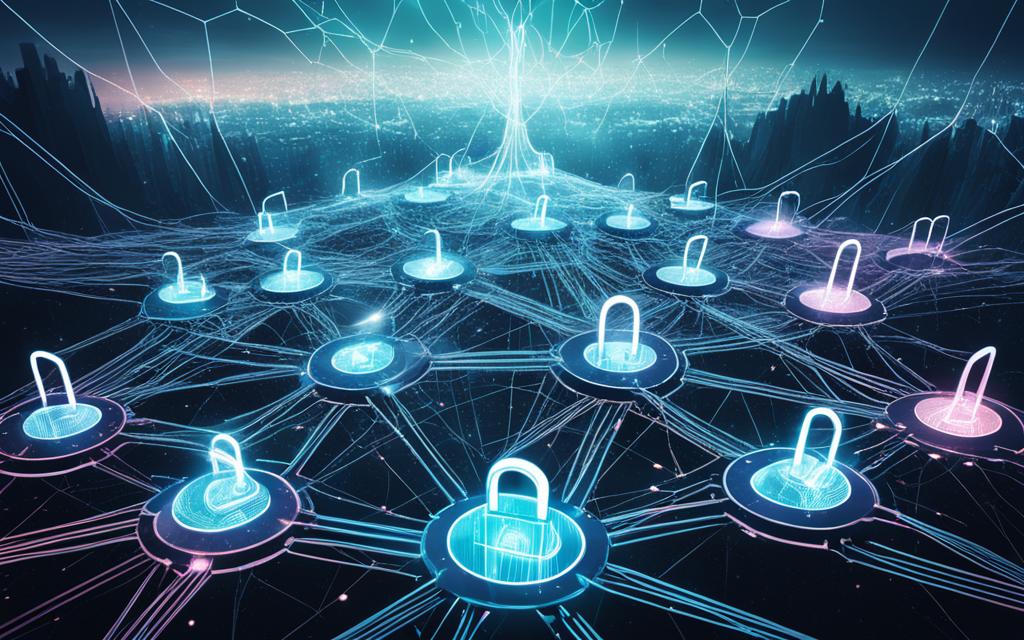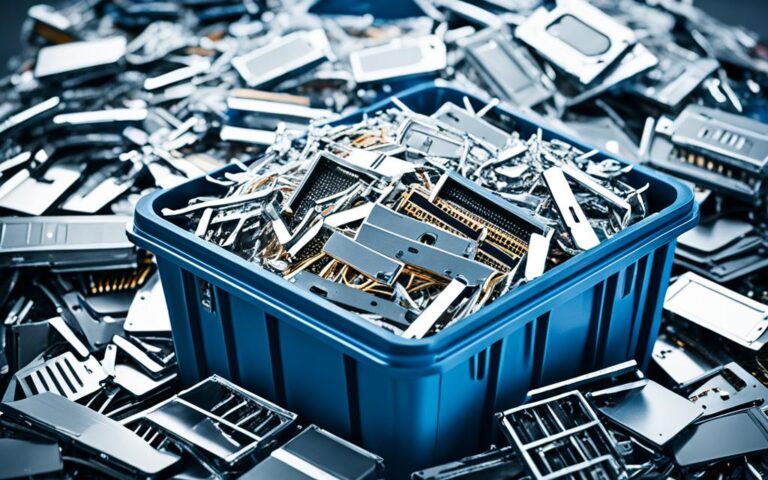The Future of Digital Data: The Need for Secure Destruction Protocols
In today’s digital age, data has become the lifeblood of businesses. From customer information to intellectual property, companies rely on vast amounts of data to drive their operations and gain a competitive edge. However, as the volume and value of digital data increase, so does the need for robust secure destruction protocols to protect sensitive information from unauthorized access or exposure.
Traditional methods like physically shredding or degaussing storage media are still widely used but can be time-consuming and costly. Innovations such as disk sanitization through software-based wiping tools and mobile shredding services have emerged to meet the growing demands for data destruction. Additionally, cloud-based storage providers have implemented enhanced encryption measures and comprehensive deletion protocols to ensure the complete eradication of customer information.
As technology continues to evolve, new trends like the use of blockchain technology and artificial intelligence (AI) are also beginning to shape the future of data destruction.
The Importance of Secure Data Destruction
With the increasing prevalence of data breaches and regulations like GDPR, secure data destruction has become crucial for businesses. Simply deleting files or reformatting a hard drive is no longer sufficient to ensure privacy and compliance. Secure data destruction methods, such as physical destruction, degaussing, and software-based wiping, render data unreadable and unrecoverable.
By prioritizing secure data destruction, organizations can protect their reputation, maintain customer trust, and comply with data protection laws. The consequences of a data breach can be severe, leading to financial losses, legal penalties, and reputational damage. Implementing robust data destruction protocols not only minimizes these risks but also demonstrates a commitment to responsible data management.
List of Benefits of Secure Data Destruction:
- Data privacy and security: Secure data destruction ensures that sensitive information is rendered completely unreadable and unrecoverable, reducing the risk of unauthorized access or data leakage.
- Regulatory compliance: By following proper data destruction procedures, businesses can comply with data protection regulations and avoid hefty fines and legal consequences.
- Reputation management: Protecting customer data through secure data destruction measures builds trust and enhances the organization’s reputation in the market.
- Preventing identity theft and fraud: Securely destroying personal and financial information safeguards individuals from identity theft and potential financial fraud.
- Business continuity: Effective data destruction practices ensure that businesses can confidently dispose of unnecessary data without the risk of it falling into the wrong hands.
“Secure data destruction is no longer an optional practice; it is an essential component of a comprehensive data protection strategy.”
The Role of Secure Data Destruction in Compliance
One of the major driving forces behind the importance of secure data destruction is the need for compliance with data protection laws and regulations. The European Union’s General Data Protection Regulation (GDPR) has established stringent guidelines for the handling and disposal of personal data. Non-compliance with GDPR can result in significant financial penalties and damage to the organization’s reputation.
Secure data destruction ensures that organizations meet their legal obligations by permanently erasing or destroying personal data once it is no longer needed. By implementing secure data destruction practices, businesses can demonstrate their commitment to protecting the privacy and rights of individuals.
Methods of Data Destruction
There are several methods used for data destruction, each with its advantages and limitations. It is essential to select the most appropriate method based on the type of media and security requirements. Here, we explore the various methods of data destruction:
1. Physical destruction
Physical destruction involves physically damaging the storage media to render it unreadable. This method often includes shredding or crushing the media into small pieces, making data recovery virtually impossible. Physical destruction is particularly suitable for hard drives, solid-state drives (SSDs), and other physical storage devices.
2. Degaussing
Degaussing is a method that uses a strong magnetic field to erase the stored data on magnetic media. By exposing the media to this magnetic field, degaussing effectively eliminates all traces of information. This method is commonly used for tapes, floppy disks, and older hard drives that rely on magnetic storage.
3. Software-based methods
Software-based methods utilize specialized programs that overwrite existing data multiple times with meaningless information, making it nearly impossible to recover the original data. These programs follow recognized algorithms, such as the Gutmann method or the Department of Defense (DoD) standards, ensuring comprehensive data erasure. This method is suitable for a wide range of storage media, including hard drives, SSDs, and USB drives.
4. Cloud-based solutions
Cloud-based solutions offer remote wiping of devices or deletion of files stored in the cloud. These solutions provide convenience and scalability, allowing businesses to securely erase data from remote devices without physical access. Cloud-based data destruction is particularly beneficial for organizations utilizing cloud storage services.
In addition to these methods, other data destruction techniques, such as incineration and pulverization, may be employed for specific industries or scenarios requiring additional security measures. It is essential to choose the appropriate data destruction method based on the sensitivity of the information, compliance requirements, and the type of media being disposed of.
As data destruction methods continue to evolve, it is crucial to stay informed and implement the most effective and secure techniques to protect sensitive information. When selecting a data destruction method, consider the specific requirements of your organization and consult with professional data destruction service providers for expert guidance.
Future Trends in Data Destruction
The future of data destruction is shaped by ongoing technological advancements and emerging trends. As digital data continues to proliferate, organizations must stay ahead of the curve to ensure the robust protection of sensitive information.
Artificial Intelligence (AI) Algorithms:
Artificial intelligence algorithms are revolutionizing data destruction processes. These advanced algorithms can analyze data storage devices with precision, identifying residual traces of information that may be hiding. By enhancing data erasure efficiency, AI algorithms contribute to stronger security protocols and make data destruction more effective.
Blockchain Technology:
Blockchain technology offers a decentralized and transparent method for securely erasing digital records. It ensures accountability and transparency throughout the data destruction process. By utilizing blockchain, organizations can safeguard sensitive information and demonstrate a commitment to responsible data management.
Advancements in Quantum Computing:
Advancements in quantum computing pose both challenges and opportunities for data destruction. Quantum computers have the potential to break current encryption methods, requiring the development of stronger security measures. However, quantum computing also presents new possibilities for secure deletion techniques, allowing for more effective data destruction.
Biometric Authentication Systems:
Biometric authentication systems, such as fingerprints or retina scans, may play a significant role in future data destruction processes. These systems offer an extra layer of security, ensuring that only authorized individuals can access and destroy sensitive data.
Benefits of Professional Data Destruction Services
Engaging professional data destruction services offers various benefits. These services ensure complete data erasure using advanced techniques, significantly reducing the risk of data breaches. They also demonstrate a commitment to privacy and security, fostering trust among customers and stakeholders. Professional data destruction services often include environmentally responsible disposal of IT assets, promoting sustainability and responsible business practices. By outsourcing data destruction to experts, organizations can focus on their core operations while ensuring the secure handling and disposal of sensitive information.
Complete Data Erasure with Advanced Techniques
Professional data destruction services employ advanced techniques to ensure the comprehensive erasure of data. Whether it’s physical destruction, degaussing, or software-based wiping, these experts have the knowledge and resources to render data unreadable and irretrievable. By utilizing industry-leading methods, professional data destruction services safeguard against potential data breaches and unauthorized access to sensitive information.
Fostering Trust through Privacy and Security
By engaging professional data destruction services, organizations demonstrate their commitment to privacy and security. These services adhere to strict protocols and guidelines to ensure the confidential handling and disposal of data. This emphasis on privacy and security fosters trust among customers, employees, and stakeholders, enhancing the organization’s reputation and mitigating the risk of data breaches.
Environmentally Responsible Disposal
Professional data destruction services often prioritize environmentally responsible disposal of IT assets. They understand the importance of minimizing the environmental impact of electronic waste and promote sustainable practices. By partnering with these services, organizations contribute to a greener future by ensuring the proper recycling and disposal of outdated or obsolete IT equipment.
“Outsourcing data destruction to professionals not only ensures secure handling and disposal but also saves valuable time and resources for organizations.”
Focus on Core Operations
Outsourcing data destruction to professional services allows organizations to focus on their core operations. By shifting the responsibility of data destruction to experts, businesses can allocate their time, manpower, and resources to strategic initiatives and essential functions. This streamlined approach enhances overall efficiency and productivity, while still ensuring the secure management of sensitive information.
| Benefits of Professional Data Destruction Services |
|---|
| Complete data erasure with advanced techniques |
| Fostering trust through privacy and security |
| Environmentally responsible disposal |
| Focus on core operations |
Partnering with professional data destruction services offers numerous advantages, including complete data erasure, enhanced privacy and security, environmentally responsible disposal, and the ability to focus on core operations. By entrusting data destruction to experts, organizations can rest assured that their sensitive information is handled with utmost care and diligence.
Considerations for Choosing a Data Destruction Service Provider
When selecting a data destruction service provider, it is essential to consider various factors to ensure the secure and responsible handling of your sensitive information. Here are some key considerations:
- Certifications: Look for service providers who hold certifications such as R2 (Responsible Recycling). These certifications indicate a commitment to ethical practices and environmentally responsible disposal of IT assets.
- Transparency and Accountability: Choose a service provider that prioritizes transparency and accountability throughout the data destruction process. They should conduct thorough audits and provide proper documentation to demonstrate compliance and adherence to industry standards.
- Customizable Solutions: Consider your unique data destruction needs. Ensure that the service provider offers customizable solutions that can accommodate your specific requirements, such as the types of media you need to destroy and any specific compliance regulations you must adhere to.
- Scalability: It’s important to choose a data destruction service provider that can scale with your organization’s changing needs. Whether you have a small number of devices to dispose of currently or anticipate a larger volume in the future, the service provider should be able to accommodate your growth without compromising security.
exIT Technologies: A Trusted Data Destruction Service Provider
When it comes to choosing a reliable data destruction service provider, consider exIT Technologies. With a solid track record and R2 Certification, exIT Technologies is committed to ethical practices and environmentally responsible IT asset disposition. They offer a comprehensive range of services to cater to your data destruction needs, from physical destruction to secure wiping tools, ensuring the complete eradication of sensitive information. By choosing exIT Technologies, you can have peace of mind knowing that your data will be handled with the utmost care and in compliance with industry standards.
Comparison of Data Destruction Service Providers
| Service Provider | Certifications | Transparency | Customizable Solutions | Scalability |
|---|---|---|---|---|
| exIT Technologies | R2 Certification | High | Yes | Yes |
| Company X | ISO 9001 | Medium | No | No |
| Company Y | NAID AAA Certification | Low | Yes | Yes |
This table provides a comparison of different data destruction service providers, highlighting key factors such as certifications, transparency, customizable solutions, and scalability. exIT Technologies stands out as a reliable choice, offering R2 Certification, high transparency, customizable solutions, and scalability, making them a comprehensive and trustworthy partner for your data destruction needs.
The Growing Relevance of Data Destruction
The ever-increasing volume of digital data, coupled with the rising number of storage hardware, and the implementation of stringent data protection laws, has undeniably amplified the importance of data destruction. As the digital landscape continues to expand exponentially, it becomes imperative to adopt secure and dependable methods to protect sensitive information throughout its lifecycle. The widespread utilization of storage devices and the subsequent need for their reallocation or disposal further emphasizes the significance of data destruction in averting potential data breaches.
Data protection laws have established legal obligations on organizations to guarantee data privacy and security, effectively transforming data destruction into a global necessity. Failure to comply with these laws can result in substantial financial penalties and irreparable damage to a company’s reputation.
To navigate these challenges effectively, businesses must adopt proactive approaches towards data destruction. By implementing reliable and robust data destruction protocols, organizations can safeguard their invaluable data assets, bolster consumer trust, and demonstrate their commitment to compliance with data protection legislation.
Conclusion
The future of data destruction is filled with exciting possibilities and innovative technologies. The emergence of AI algorithms, blockchain technology, advancements in quantum computing, and biometric authentication systems is transforming the field of secure data destruction.
By prioritizing the secure destruction of data, organizations can safeguard sensitive information, comply with data protection laws, and contribute to a more sustainable future. Professional data destruction services offer comprehensive solutions that address the challenges of data privacy and security, ensuring the responsible handling and disposal of IT assets.
It is crucial for businesses of all sizes to recognize the importance of data destruction. Selecting trusted partners like exIT Technologies can help organizations protect their data and maintain ethical and environmental standards. By embracing secure data destruction practices, businesses can mitigate the risk of data breaches, foster customer trust, and demonstrate their commitment to privacy and compliance.
Investing in secure data destruction is not just a legal and ethical obligation, but it also contributes to the overall well-being of organizations and the protection of sensitive information in the digital age.
FAQ
What is data destruction?
Data destruction refers to the process of permanently deleting or erasing data from storage media to prevent unauthorized access or exposure. It ensures that sensitive information cannot be recovered or accessed by anyone.
Why is secure data destruction important?
Secure data destruction is important to protect sensitive information, maintain privacy, comply with data protection regulations, prevent data breaches, and safeguard a company’s reputation and customer trust.
What are the methods of data destruction?
The methods of data destruction include physical destruction (such as shredding or crushing), degaussing (using magnetic fields to erase data), software-based wiping (overwriting data multiple times), and cloud-based solutions (remote wiping of devices or deletion of files stored in the cloud).
What are the future trends in data destruction?
Future trends in data destruction include the use of artificial intelligence (AI) algorithms to enhance data erasure efficiency, blockchain technology for transparent and secure erasure of digital records, advancements in quantum computing for both challenges and opportunities in secure deletion techniques, and the integration of biometric authentication systems for added security.
What are the benefits of professional data destruction services?
Professional data destruction services offer various benefits, including complete data erasure using advanced techniques, reduced risk of data breaches, commitment to privacy and security, trust-building among customers and stakeholders, and environmentally responsible disposal of IT assets.
What should be considered when choosing a data destruction service provider?
When selecting a data destruction service provider, consider certifications such as R2 (Responsible Recycling), transparency and accountability in the data destruction process, customizable solutions and scalability to accommodate unique data destruction needs, and a trusted track record like that of exIT Technologies.
Why is data destruction growing in relevance?
The increasing volume of digital data, the cumulative count of storage hardware, and the enactment of data protection laws have contributed to the growing relevance of data destruction. Organizations need secure and reliable methods to protect sensitive information and comply with legal obligations to ensure data privacy and security.
What is the conclusion of data destruction?
Data destruction is crucial for businesses of all sizes to protect their data, comply with data protection laws, and contribute to a more sustainable future. Professional data destruction services, like those offered by exIT Technologies, ensure the responsible handling and disposal of IT assets while maintaining ethical and environmental standards.















